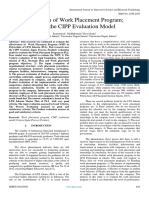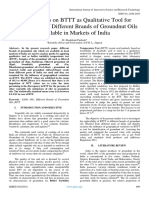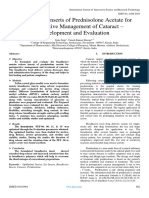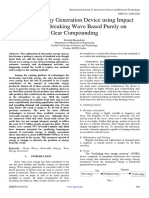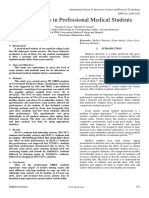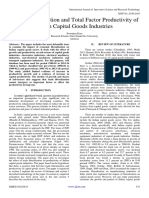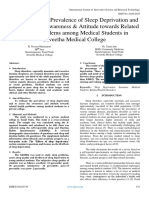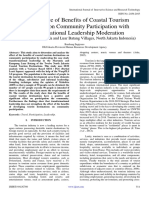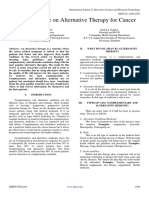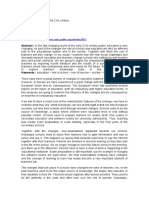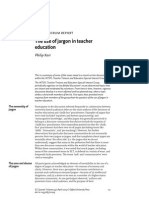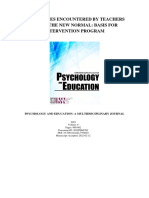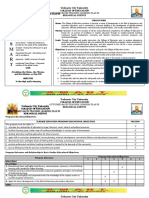Professional Documents
Culture Documents
Teaching Practice Assessment Challenges in Primary Teachers' Training Colleges and Recommendations On Addressing Them: A Case of Borabu Teachers College in Nyamira County, Kenya
Uploaded by
Anonymous izrFWiQOriginal Title
Copyright
Available Formats
Share this document
Did you find this document useful?
Is this content inappropriate?
Report this DocumentCopyright:
Available Formats
Teaching Practice Assessment Challenges in Primary Teachers' Training Colleges and Recommendations On Addressing Them: A Case of Borabu Teachers College in Nyamira County, Kenya
Uploaded by
Anonymous izrFWiQCopyright:
Available Formats
Volume 4, Issue 5, May– 2019 International Journal of Innovative Science and Research Technology
ISSN No:-2456-2165
Teaching Practice Assessment Challenges in Primary
Teachers’ Training Colleges and Recommendations on
Addressing Them: A Case of Borabu Teachers
College in Nyamira County, Kenya
Dr. George K B M Sagwe
Abstract:- Teachers undergo a specified period of I. INTRODUCTION AND BACKGROUND
training, assessment and examinations to ascertain
success before they can be assigned teaching In Kenya students in primary teachers colleges go on
responsibilities in Kenya. This study was conducted in teaching practice three times during their two year training.
Borabu Teachers’ Training College which is one of the The teaching practice is concurrently conducted with the
primary teachers training colleges in Kenya to establish theory learning during the course programme. First year
whether teaching practice assessment that is conducted students go for their first teaching practice in their second
on teacher trainees has influence on trainees’ suitability term in college. The second teaching practice is undertaken
in the teaching profession. This study was also to in the first terms of their second year after they have done the
investigate the role of practical teaching assessment on end of first year theory examination commonly referred as
professional development of student teachers. Case study ‘mid course’ and the final teaching practice in the last term of
design was the bedrock research design employed and their studies that is also accompanied with the final course
questionnaires used to collect data. The study population examination, Primary Teacher Education (PTE) examination.
was made up of all the 22 tutors with a sample of 12 This study is conducted to investigate how effective
tutors because they were involved in the assessment supervision of trainees by tutors is in the professional
during teaching practice though they lacked experience of development of student teachers.
teaching in primary teachers’ training college. Qualitative
data was thematically analyzed to generate themes as Teaching practice, commonly referred to as TP
quantitative data was subjected to analysis employing the constitutes an important part of the teacher- training
SPSS programme and data represented in tables of programme. Students observe it as the most challenging
frequencies and percentages. Deducing from collected based on their involvement in preparing the relevant
and analysed data the study concluded that assessments professional documents, teaching / learning resources and
of teaching practice by tutors were not reliable as other aids to enhance learning. It is most challenging
different tutors are prone to come up with different especially when concern tutors have to redirect a trainee to
remarks in assessing same lesson by same practicing re-do a certain task when not satisfying the required threshold
teacher. The study established that tutors are comfortable or when the timelines are crumbling and a trainee hasn’t
when one assesses a trainee teachers teaching in a subject accomplished the requirements. Teaching practice on the
area in which they had solid content knowledge. The other hand becomes an exciting expedition of a teacher
study concluded that teacher trainees should be assessed training as well as this provides an opportunity for one to test
by tutors who have background knowledge based on and evaluate ones level of achievement in the students’
relevant training and past experiences. The study further teaching skills. At Borabu Teachers’ College, student
enlisted that trainees in teachers’ training colleges do not teachers are attached to schools under a mentor, school tutor,
get adequate and expected desirable professional for practical teaching in real classroom situations for three
preparation due to incoherence in their training and teaching practice sessions, this starts in the second term of
teaching practice when assessed by tutors who were non- the first year after going through curriculum orientation and
specialists. The study recommends that college tutors methodology teaching in their first term when they have
should be oriented in assessing teaching practice upon reported after admission. The first and second teaching
appointment. Tutors should assess students teaching a practices are assessed internally with the college tutors with
subject area in which they are knowledgeable in to avoid the third and final assessed both internally and externally.
subjective assessment of teaching practice.
Teaching practice serves more than one function for the
Keywords:- Assessment, Teaching Practice, Professional trainee teacher. Foremost it is important in checking
Development, Lecturer, Tutor, Team Assessment. achievement level of trainee skills development and testing
their teaching skills. On the other hand trainees are subjected
IJISRT19MY551 www.ijisrt.com 815
Volume 4, Issue 5, May– 2019 International Journal of Innovative Science and Research Technology
ISSN No:-2456-2165
to rigorous supervision by tutors during practical teaching as gone through primary teacher training as trainees or have
they are being assessed. It is therefore important that they are been trained or inducted to teacher the trainee courses so as
given the appropriate support and the opportunity to make a to satisfy the pedagogical demands of the subjects offered at
good start. Study by Gipps (2004) observes that trainee primary school and minimize inconsistencies.
assessment need to be a systematic process that goal directed
and whose judgment concerns the extent of goals Shumbayaonda (2007) contends that the effectiveness
achievement. Tutors visiting schools have a sole mandate of teaching practice assessment is influenced by experience
advice/ guide trainees as they assess individual trainee’s and knowledge base of the tutors on practical teaching and
performances and award a mark to trainees who teach any of subject content. Hence experience and expertise play an
the subjects in the primary school curriculum based on their important role in ensuring effective teaching practice
self prepared approved timetable. Though the tutors to assess assessment. Though, those who have gone through the
the trainees have background knowledge in one or two primary teacher training and have received further
academic areas, they are expected to assess trainees teaching professional training or orientation are perceived to play a
in any of the subjects of the primary school curriculum. key role due to multiple exposure factors.
Tutors taking teaching practice assessment are guided This current research holds on one assumption that
by assessment guidelines in the individual trainee’s teaching practice assessment has myriad of inconsistencies
assessment booklet provided by the institution on what to and its subjectivity calls for an establishment of a valid and
look for in a lesson. Study by Uhlenbeck et al. (2002) on reliable methodology in judgement of teacher trainees’
factors influencing teacher trainees’ performance during performance in practical teaching. According to Makoni
teaching practice identified that teaching practice assessment (2000) emphasis should be on consistency as well as validity
impacts on trainee’s performance during practical teaching. and reliability of teaching practice assessment during teacher
the study further observed that when trainees teach without trainees’ practical teaching. The study further opined that that
the presence of supervisor they deliver well though it is can be only a product of well oriented or trained tutors in
commonly used in assessment of student teachers to establish assessment of practical teaching. It is hoped that findings of
their ability to disseminate instructional content to learners in this study will be an eye opener to stakeholders involved in
a class setup. This study was directed on the aspect of planning for teacher trainee training and assessment of
validity and reliability as it is the main challenge based on the teaching practice towards the development of programmes
nature of supervisors involved and how it is conducted which for tutors to address the challenges and inconsistencies in
is also a concern by Stones and Morris (2001) that there is trainees’ practical teaching to enhance validity and reliability
need to establish the reliability and validity of the assessment of the processes. The findings will also assist in reducing
process. The studies identified challenges facing teaching subjectivity in teaching practice assessment and be an eye
practice assessment such as: opener to the teachers’ employer, (Teachers Service
The lack of validity and reliability of the teaching marks Commission, TSC) whenever making decisions on hiring
awarded tutors or contracting professionals to manage practical
Lacks of practical value of the assessment grading. teacher practice especially the final teaching practice which
Assessment grades lack objectivity in teaching practice is conducted by external assessors above the internal
and some circumstances strain the student –tutor assessors.
(assessor) relationship.
II. STATEMENT OF THE PROBLEM
Focusing on the various challenges a study by Stones
and Morris (2001) recommends the need for performance- Perception by a number of stakeholders and the teacher
based assessment to be used in assessment of teacher trainees trainees involved in the Teaching practice or assessment in
in teachers’ training colleges though the study questions Kenya identifies a myriad of inconsistencies in the process.
effectiveness and consistence of tutors when assessing Lack of reliability and validity is a concern of all parties
different subjects. Study by Brown and Brown (2007) further concern which has always been interrogated by trainees and
contends that the inconsistencies arising among different tutors alike. Observed that most tutors in the interested locale
assessors who assess the same student even at the same time have either been absorbed from teaching in secondary
and same subject bring to doubt the credibility of the schools, or administrators with inability or having been faced
assessments. In addition, Shumbayaonda (2007) points out with other professional challenges or from primary schools
that lack of background knowledge and training on the part through a window of attaining higher qualification hence
of tutors on assessment of practical teaching as a challenge most tutors safe for those with primary teacher background
facing teaching practice in teacher trainees. This the study do not have basic training in assessing practicing primary
observes as the product of majority of tutors lacking primary teachers. Cases of inconsistencies are prominent especially
teacher training background and training hence calls for the with the inception and launch of the Competency Based
need for adequate and appropriate orientation and training of Curriculum which they have to assess teacher trainees while
tutors on teaching practice assessment by those who have a majority or almost all are ill equipped. Hence this research
IJISRT19MY551 www.ijisrt.com 816
Volume 4, Issue 5, May– 2019 International Journal of Innovative Science and Research Technology
ISSN No:-2456-2165
was carried out to establish factors affecting teaching practice B. Content Knowledge Gaps Prevalent in Teaching Practice
assessment by college tutors and how these factors can be Assessment
addressed so as to impact positively on teacher trainees’ According to Luckett and Sutherland cited in Makoni,
professional development. (2000), colleges undertake teaching practice assessment in
order to establish the level of trainees’ achievements based
Research Objectives on standards set by the institution or government. It works as
i. To establish factors impacting on teaching practice a gauge of acquisition of relevant skilled and competences
assessment in primary teachers colleges. suitable to undertake real field teaching after the training.
ii. To determine the content knowledge gaps on teaching This according to Yost et al. (2012) can be achieved through
practice assessment prevalent among tutors. constant collegiality trainees and assessors which can be
iii. To provide recommendations on how teaching practice achieved through dialogue, writing and guiding of teacher
assessment can be improved to enhance its validity and trainees on what teaching practice entails; its expectations
reliability. and the means towards such achievement. Further, one
wonders, how much advice or content can an assessor who is
Research Questions or not a specialist in the task/ subject in question discuss with
Therefore the study seeks to find answers to the or writes for a trainee during a 35 minute lesson? Or what
following research questions: impact can it have on the subsequent lessons when the tutor/
i. What factors impact on effective assessment of teaching assessor have inconsistencies?
practice in primary teacher colleges?
ii. What content knowledge gaps are prevalent in teaching According to Luckett and Sutherland, (2000) there are
practice assessment among tutors? various forms of assessment, which are based on purposes
iii. How can teaching practice assessment be improved to such as diagnostic assessment, formative assessment,
enhance validity and reliability? summative assessment and quality Assurance of which
teaching practice assessment is categorized as either
III. LITERATURE REVIEW formative or summative. The ongoing practical teaching
provides for continuous assessment accruing to the final
A. Factors Impacting on Teaching Practice Assessment summative evaluation during the final teaching practice.
Assessment according to Avalos, (2009) is the process Studies reveal that at the summative assessment level
of determining whether there has been change in learners’ supervisors may exert a lot of pressure on trainees as this also
behavior in relation to the stated teaching- learning has an impact on the college based on the observations made
objectives. It is therefore imperative that practical teaching is by external examiners. This study observes the need for
assessed and judged to ascertain quality of teaching by the continuous guidance of trainees to be to embrace the training
trainees. Brown and Brown (2007) observes that practice and requirements to avoid the pressures hence exercising
assessment involves the tutors taking an observation of what restraint from the part of the tutors is vital in utilizing time
the trainees do, making inferences and estimating the level of resource responsibly and accountably.
performance hence accountability is in the court of that tutors
in assessment of trainee teachers during teaching practice C. Assessment of Teaching Practice
which is the focus of this study to establish factors Teachers on teaching practice are usually given time to
influencing teaching practice assessment in primary teachers’ undertake the practice. Teaching practice is a process though
training colleges in Kenya and their impact on trainee in some incidences taken as an event which just occurs at a
teachers’ professional development. particular time. Teaching practice assessment is guided by a
pre-prepared assessment guideline in the trainees’ assessment
Teaching practice is conducted by different persons in booklet. The form has outlined items and criteria to be used
different institutions for a variety of reasons. Teaching in judgement of performance in the teaching practice lesson.
practice is multifaceted as different stakeholders have The assessor makes reference on the already set criterion
different expectations and reasons for conducting both with the aim of reducing subjectivity in the assessment as
teaching practice and assessment. For trainees teaching performance is judged against pre-specified criteria or
practice assessment is expected to be a means for self standards. Brown and Brown, (2007) observed that trainee’s
evaluation on how they are progressing and a way of seeking performance is compared to that of the peers with the aim of
recognition of their achievements by others and the comparing and ranking teacher trainees of different colleges
institution especially when they feel they are performing after undertaking teaching practice. An institution can use
well. In the case of tutors assess is a way of establishing assessment carried out by tutors to determine the level of
whether trainees have mastered key concepts and skills, in attainment of teaching skills by trainees choosing an
teaching to what level and which areas need advice, appropriate method for the purpose of assessment in teacher
improvement or adjustments. training colleges is of importance.
IJISRT19MY551 www.ijisrt.com 817
Volume 4, Issue 5, May– 2019 International Journal of Innovative Science and Research Technology
ISSN No:-2456-2165
Brown, (2007) identifies that a number of scholars have Kenya and majority new college tutor entrants. The
undertaken studies which has shown that there are great purposive sampling technique was used to select the tutors as
inconsistencies between different assessors assessing the respondents.
same work done by teacher trainees even under similar
circumstances and recommended for the need to minimize C. Data Collection and Analysis
the inconsistencies to make teaching practice assessment A closed- and open-ended questionnaire was used to
valid and reliable so as to serve the intended purposes though collect data from tutors who responded to the questions. The
these assessments are influenced by the different assessment questionnaire was preferred because it enabled tutors to give
approaches such as the traditional approach where the tutors their own experience on teaching practice and the population
are usually considered to be the only legitimate assessors and sample is literate hence data collection through questionnaire
integrated assessment or computer –based assessment which was fast and convenient. These tutors had been involved in
takes least cognizance of the input-output yardstick. teaching practice assessment in the first and second year
training of teachers. The SPSS programme was used to
Luckett and Sutherland, (2000) have observed that analyse quantitative data in tables containing percentages and
trainees’ assessments of performance during teaching frequencies while qualitative data would be analysed
practice is conducted by the trainees’ tutors who are also thematically and represented as themes.
their teachers in class. The tutors are trained professionals
and their assessment relies heavily on their professional V. DATA PRESENTATION AND DISCUSSION
judgment and questions of objectivity arise since a tutor may
assess a trainee with a prior established opinion arising from N %
previous classroom or in college interactions. These further Males 5 41.7
points to what may arise as a result of assessments of subjects Females 7 58.3
which the tutor has no mastery and may not be specialists in Total 12 100.00
though Locket and Sutherland (2000) further echoed that in Table 1:- Gender Composition (N=12)
assessment, the issues of objectivity and subjectivity will
always arise among scholars hence the need to acknowledge The distribution of tutors who participated in this
that different assessors interpret student performances using research shows that 41.7% were males and 58.3% were
different standards making the assessments subjective in females. As such the results of this study were not influenced
nature. The study suggests the need to minimize issues of by gender imbalances.
inconsistencies and subjectivity by employing double grading
or cross grading of assessment to improve reliability while
N Percentage
emphasize should be put on the need to make reliable and
Below 5 years 6 50.00
valid qualitative and quantitative judgments by assessors
when assessing teaching practice. 6 – 10 years 5 41.7
Above 10 years 1 8.3
IV. METHODOLOGY Total 12 100.00
Table 2:- Work Experience
A. Research Design
To give a more focused study on the study topic this The majority of the tutors (50%) had less than 5years of
study employed case study as it suitable in soliciting data in tutoring experience. The years of experience have a bearing
depth from pre defined respondents from a known target on the results of the study since it shows that the majority of
locale and population. The design is also favoured for this the tutors had little experience in supervision of teaching
study as it gives a more focused ground of obtaining experience as such they needed more guidance and staff
respondents opinions, perceptions and views on the study development.
topic as directed by identified locale Borabu Teachers’
College. Subject N Percentage
Social studies 3 25.0
B. Population and Sample Mathematics 1 8.3
Borabu Teachers Training College has a total of 22 Sciences 2 16.7
tutors and all were considered as the target population. English 3 25.0
Twelve tutors at Borabu Teachers’ College were purposively Kiswahili 2 16.7
selected on the basis of willingness to respond to a Education 1 8.3
questionnaire out of a population of 22 tutors. These tutors Total 12 100.00
were preferred because they were willing to provide the Table 3:- Distribution of tutors in Area of Specialization
relevant data on teaching practice assessment. Borabu
Teachers’ College was preferred because the research
considered its young establishment among other colleges in
IJISRT19MY551 www.ijisrt.com 818
Volume 4, Issue 5, May– 2019 International Journal of Innovative Science and Research Technology
ISSN No:-2456-2165
Table 3 shows that most of the tutors who participated Not Just Very
in this research specialized in Social studies, English and Subjects competent competent competent
Kiswahili at (25%) each. Only a few were specialized in N % N % N %
Mathematics (8.3%) and Science (16.7%). In Teacher Mathematics 4 33.3 7 58.3 1 8.3
Education, Education lays a foundational theoretical English 1 8.3 9 75.0 2 16.7
framework for effective teaching. As such the participation of Kiswahili 5 41.7 6 50.0 1 8.3
less tutors from Education Department opined that the Science 6 50.0 4 33.3 2 16.7
researchers relevant data relates to teacher preparation is Creative Art 8 66.7 3 25.0 1 8.3
scanty. Social 3 25.0 7 58.3 2 16.7
Studies
Qualification N Percentage CRE 6 50.0 5 41.7 1 8.3
undergraduate Degree 7 58.3 Physical 7 58.3 2 16.7 3 25.0
Masters Degree 3 25.0 Education
Doctoral Degree 2 16.7 Table 6:- Level of Competency in Assessment of Teaching
Total 12 100.0 Practice (N=12)
Table 4:- Qualifications of tutors (N=12)
Asked to indicate the tutors’ own level of competency
Most of the tutors (58.3%) who participated in this in the assessment of practical teaching, most tutors revealed
study had undergraduate degree and only 25% had master’s that they were not competent to assess Creative Art (66.7%),
degree qualifications. With only 2 (16.7%) tutors having English (8.3%), Kiswahili (41.7%), Social Studies (25.0%),
doctoral qualification the assumption is that students will be Physical Education (58.3%), C.R.E (50.0%), Science (50.0%)
effectively trained and guided well in their professional and Mathematics (33.3%). Most tutors 3 (25.0%) though
development by these experts. indicated that they were very competent in assessing Physical
Education yet this is a specialist area and colleges have found
N Percentage that it is difficult to get highly qualified tutors in this area.
Able to assess all subjects 5 41.7
Not able to assess all subjects 7 58.3 Little extent Not sure To a great extent
Total 12 100.0 N % N % N %
Table 5:- Primary School Subjects Tutors’ Ability to Assess 6 50.0 4 33.3 2 16.7
Effectively (N=12) Table 7:- Orientation of Tutors on Appointment (N=12)
Most tutors 7(58.3%) could not comfortably assess In trying to determine the extent to which tutors have
students teach all the subjects of the primary school been oriented when they were appointed, almost half of the
curriculum. However, 5(41.7%) claimed that they could tutors 6(50.0%) indicated that they were received little
assess students teach in all the subjects in the primary school orientation to a great extent, 2(16.7%) were oriented and
curriculum. From the findings it seems most tutors were not another 4 (33.3%) were not sure if really they were
in a position to assess students teaching any subject in the adequately oriented.
primary school but would prefer to assess students teach
certain subjects in which they were more comfortable.
Statement Agree Not sure Disagree
N % N % N %
Lack of relevant Past teaching Experience 3 25.0 6 50.0 3 25.0
Inadequate time for assessment 7 58.3 3 25.0 2 16.7
Lack of specialist pedagogical Knowledge 2 16.7 4 33.3 6 50.0
Lack of content in subject area 9 75.0 1 8.3 2 16.7
Lack of supervisory skills 1 8.3 4 33.3 7 58.3
Limitation in scope of assessment Instrument 2 16.7 1 8.3 9 75.0
Table 8:- Factors Contributing to Failure to Assess Effectively
The majority of the tutors concurred, that the following inadequate time for assessment, limitation in the scope of the
factors contributed to failure to effectively assess students assessment instruments. The factors need to be ranked when
practical teaching; these included past teaching experience, presented as per the findings.
area of specialization, lack of content in subject area and
IJISRT19MY551 www.ijisrt.com 819
Volume 4, Issue 5, May– 2019 International Journal of Innovative Science and Research Technology
ISSN No:-2456-2165
Statement Agree Not sure Disagree
N % N % N %
Tutors need adequate orientation 5 41.7 3 25.0 4 33.3
Tutors need to be continuously staff developed 8 66.7 1 8.3 3 25.0
Tutors should only assess subjects of specialization 10 83.3 0 00 2 16.7
Pair or team assessment 4 33.3 2 16.7 6 50.0
Table 9:- Factors That Can Assist In Improving the Assessment of Teaching Practice
The majority of tutors observed that ensuring tutors Curriculum (CBC) in Kenya which none of the tutors can
assess subjects in which they are specialists 10(83.3%) with claim compence in handling it and so the question that
the lowest 2(16.7%) disagreeing. out of the total eight arises; if the assessor has least or no knowledge of the
respondents 8 (66.7%) agreed that assessment can be more curriculum which he/ she is to assess what of the trainees
effective and can be improved through staff development to be assessed? And can the assessor assess what he/ she
with 5(41.7%) supporting adequate orientation and 4(33.3%) doesn’t know?
giving preference to team/pair assessment which a large Inadequate time for effective assessment during teaching
number of respondents 6(50%) disagreed that it can assist in practice as most time is used in preparing teaching/
improving assessment of teaching practice. learning resources as compared to the really classroom
practise .
VI. DISCUSSION
These results concur with the observations made by
Based on the findings from the respondents it was Shumbayaonda (2000) that the tutors lacked content and
depicted that most tutors challenges in assessing trainees training in teaching practice assessment. The tutors found the
teach subject areas in which they no background orientation assessment instrument as limited in scope and majority were
hence majority were not objectively able to assess trainees not aware of the pedagogical knowledge needed to assist
teach most of the subjects of the primary school curriculum. students relevant to the primary school curriculum as
Despite having prescribed assessment guidelines to guide in majority had no prior interaction with the curriculum as they
assessment majority were ill or not well equipped to had bachelors degree orientations from university education
assessing most subjects taught in primary school curriculum which had little link to the curriculum they teach and purport
by trainees. The study findings provide an authenticated to supervise at the primary teacher training college.
conclusion that tutors taking practical assessment of teachers
who are not fully inducted before undertaking the exercise do To improve teaching practice assessment the tutors
not objectively assist trainees in their teaching skills suggested the following strategies as useful, these included;
acquisition towards their desired professional development Tutors should be allowed to assess their areas of
hence the assessment results of teaching practice become specialization only so as to advice trainees appropriately.
unreliable and largely invalid. Staff development and refreshment of tutors in the areas
of teaching practice and assessment should be frequently
The tutors identified the following challenges as done.
contributing to their incompetency in assessing teaching There is need for frequent and proper orientation of tutors
practice. These included; upon appointment as college tutors on all areas
Lack of past teaching/ learning experience which was a undertaken in primary teacher training especially teaching
common challenge for those tutors who did not undergo practise assessment.
primary teacher training before being deployed to teach in There is need to ensure that there is a variety of
a primary teacher training college. assessment techniques so as triangulate the results and
Lack of pedagogical knowledge resulting from the improve their reliability and validity like team/ pair or
inability or unwillingness to learn from colleagues. It is multiple assessment approach used in teaching practice
also a result of inability to offer structured orientation of assessment in teachers colleges.
new staff before being assigned assessment duties.
The limited scope of the assessment guideline instrument VII. CONCLUSION
which leaves it to the individual assessor’s interpretation
making it relative and lacking objectivity. This study established that teaching practice assessment
Lack of subject content as most tutors especially those outcomes can be objectively used to ascertain a teacher
who have Diploma or university inclination background trainee’s suitability in teaching based on the
are trained to teach at most two subjects hence will recommendations of the findings of this study and concluded
fumble through assessing areas which they least have that student teachers should get adequate grounding and
understanding. this has been complicated further by the preparation as professionals to teach effectively with
introduction of a new curriculum, The Competency Based confidence in the primary schools upon completion of the
IJISRT19MY551 www.ijisrt.com 820
Volume 4, Issue 5, May– 2019 International Journal of Innovative Science and Research Technology
ISSN No:-2456-2165
practice programme. Tutors should be oriented to assess REFERENCES
teaching practice upon appointment and their professional
competences refreshed regularly through institutional [1]. Avalos, B. (2009). Approaches to Teacher Education.
appraisals to enable them possess relevant content knowledge Initial Teacher Training. London, Pall Mall
to objectively teach and assess student teachers during [2]. Brown, D. P. and Brown, R. (2007). Effective Teaching
teaching practice. Practice: A Guide For Students Teachers and Their
Supervisors. New York, Stanley Thornes Publishers.
RECOMMENDATIONS [3]. Luckett, K. and Sutherland, L. M. in Makoni, S. (2000).
Improving Teaching and Learning in Higher
Guided by the findings, responses from respondents Education. A Handbook for Southern Africa.
who are the tutors and the reviewed literature the following Witwatersrand, Witwatersrand University Press.
recommendations were made; [4]. Maposa R, Ndamba, G. T. (2012) Supervision of
Tutors in teachers colleges should only assess students Student Teachers: A Journey of Discoveries by
teaching in a subject area in which they have adequate Mentors in Bulawayo; Journal of Emerging Trends
content knowledge as well as the pedagogical know-how. in Educational Research and Policy Studies (3) 1:76-62
Tutors should be thoroughly oriented by relevant [5]. Harlen, W. (2007). Teaching and Learning Primary
specialists in the area of teaching practice assessment Science: London, Paul Chapman Publishing Ltd.
upon appointment to the position of lecturer or tutor and [6]. Gipps, C. (2004). A Framework for Educational
given responsibility in a teachers training college. Assessment. Beyond Testing: Towards a Theory of
Lectures/ tutors should be frequently trained in the area of Educational Assessment. London. Falmer Press.
teaching practice assessment and need to be staff [7]. Shumbayaonda, W. (2001). An investigation into The
developed from time to time based on the dynamics of Effectiveness Of Teaching Practice Supervision At
education in the county. Primary Teachers’ colleges. Unpublished Med. Thesis
Recruitment of lecturers/ tutors in primary training [8]. Stones, E. Morris, S. (2001). Teaching Practice
teachers’ colleges should consider relevant past Problems and Perspectives. New York, Methuen and
experience to primary school teaching so that these tutors Co. Ltd.
can assist with hands on approaches to primary school [9]. Uhlenbeck, A. M, Verloop, N, Beijaard, D (2002).
teaching. Requirements for Assessment Procedures for
Teachers’ Colleges need to introduce, facilitate and equip Beginning Teachers: Implications from Recent
well selected specialized teams or pairs for assessment Theories on Teaching and Assessment
techniques to be used during teaching practice assessment Teacher College Record Volume 104 (2; 242-272)
to improve on effectiveness. Teachers College, Columbia University
The teaching practice assessment instrument needs to be
improved to enhance its objectivity and tutors should
spend more time with the students during classroom
observation and teaching practice assessment.
The study established that assessment of student trainees
need to be friendlier, guiding and meant to improve future
performance of the practicing teacher trainees and not
intimidative or fault finding.
This study recommends the need for individual tutor
assessment of a teacher trainee to follow up with ease the
recommendations previously made after observing the
trainee teacher.
The study provides for initial meeting before assessment
by tutors which should be alternated with coaching the
trainee to discuss merits and demerits of the assessed
lesson before taking another class during assessment.
IJISRT19MY551 www.ijisrt.com 821
You might also like
- Evaluation of Assessing The Purity of Sesame Oil Available in Markets of India Using Bellier Turbidity Temperature Test (BTTT)Document4 pagesEvaluation of Assessing The Purity of Sesame Oil Available in Markets of India Using Bellier Turbidity Temperature Test (BTTT)Anonymous izrFWiQNo ratings yet
- IJISRT19AUG928Document6 pagesIJISRT19AUG928Anonymous izrFWiQNo ratings yet
- Analysis of Ancol Beach Object Development Using Business Model Canvas ApproachDocument8 pagesAnalysis of Ancol Beach Object Development Using Business Model Canvas ApproachAnonymous izrFWiQNo ratings yet
- Teacher Leaders' Experience in The Shared Leadership ModelDocument4 pagesTeacher Leaders' Experience in The Shared Leadership ModelAnonymous izrFWiQNo ratings yet
- IJISRT19AUG928Document6 pagesIJISRT19AUG928Anonymous izrFWiQNo ratings yet
- Platelet-Rich Plasma in Orthodontics - A ReviewDocument6 pagesPlatelet-Rich Plasma in Orthodontics - A ReviewAnonymous izrFWiQNo ratings yet
- Incidence of Temporary Threshold Shift After MRI (Head and Neck) in Tertiary Care CentreDocument4 pagesIncidence of Temporary Threshold Shift After MRI (Head and Neck) in Tertiary Care CentreAnonymous izrFWiQNo ratings yet
- Investigations On BTTT As Qualitative Tool For Identification of Different Brands of Groundnut Oils Available in Markets of IndiaDocument5 pagesInvestigations On BTTT As Qualitative Tool For Identification of Different Brands of Groundnut Oils Available in Markets of IndiaAnonymous izrFWiQNo ratings yet
- Bioadhesive Inserts of Prednisolone Acetate For Postoperative Management of Cataract - Development and EvaluationDocument8 pagesBioadhesive Inserts of Prednisolone Acetate For Postoperative Management of Cataract - Development and EvaluationAnonymous izrFWiQNo ratings yet
- Knowledge and Utilisation of Various Schemes of RCH Program Among Antenatal Women and Mothers Having Less Than Five Child in A Semi-Urban Township of ChennaiDocument5 pagesKnowledge and Utilisation of Various Schemes of RCH Program Among Antenatal Women and Mothers Having Less Than Five Child in A Semi-Urban Township of ChennaiAnonymous izrFWiQNo ratings yet
- Design and Analysis of Humanitarian Aid Delivery RC AircraftDocument6 pagesDesign and Analysis of Humanitarian Aid Delivery RC AircraftAnonymous izrFWiQNo ratings yet
- A Wave Energy Generation Device Using Impact Force of A Breaking Wave Based Purely On Gear CompoundingDocument8 pagesA Wave Energy Generation Device Using Impact Force of A Breaking Wave Based Purely On Gear CompoundingAnonymous izrFWiQNo ratings yet
- Securitization of Government School Building by PPP ModelDocument8 pagesSecuritization of Government School Building by PPP ModelAnonymous izrFWiQNo ratings yet
- Closure of Midline Diastema by Multidisciplinary Approach - A Case ReportDocument5 pagesClosure of Midline Diastema by Multidisciplinary Approach - A Case ReportAnonymous izrFWiQNo ratings yet
- Experimental Investigation On Performance of Pre-Mixed Charge Compression Ignition EngineDocument5 pagesExperimental Investigation On Performance of Pre-Mixed Charge Compression Ignition EngineAnonymous izrFWiQNo ratings yet
- Women in The Civil Service: Performance, Leadership and EqualityDocument4 pagesWomen in The Civil Service: Performance, Leadership and EqualityAnonymous izrFWiQNo ratings yet
- Comparison of Continuum Constitutive Hyperelastic Models Based On Exponential FormsDocument8 pagesComparison of Continuum Constitutive Hyperelastic Models Based On Exponential FormsAnonymous izrFWiQNo ratings yet
- Child Rights Violation and Mechanism For Protection of Children Rights in Southern Africa: A Perspective of Central, Eastern and Luapula Provinces of ZambiaDocument13 pagesChild Rights Violation and Mechanism For Protection of Children Rights in Southern Africa: A Perspective of Central, Eastern and Luapula Provinces of ZambiaAnonymous izrFWiQNo ratings yet
- Exam Anxiety in Professional Medical StudentsDocument5 pagesExam Anxiety in Professional Medical StudentsAnonymous izrFWiQ100% (1)
- SWOT Analysis and Development of Culture-Based Accounting Curriculum ModelDocument11 pagesSWOT Analysis and Development of Culture-Based Accounting Curriculum ModelAnonymous izrFWiQNo ratings yet
- Application of Analytical Hierarchy Process Method On The Selection Process of Fresh Fruit Bunch Palm Oil SupplierDocument12 pagesApplication of Analytical Hierarchy Process Method On The Selection Process of Fresh Fruit Bunch Palm Oil SupplierAnonymous izrFWiQNo ratings yet
- Enhanced Opinion Mining Approach For Product ReviewsDocument4 pagesEnhanced Opinion Mining Approach For Product ReviewsAnonymous izrFWiQNo ratings yet
- Risk Assessment: A Mandatory Evaluation and Analysis of Periodontal Tissue in General Population - A SurveyDocument7 pagesRisk Assessment: A Mandatory Evaluation and Analysis of Periodontal Tissue in General Population - A SurveyAnonymous izrFWiQNo ratings yet
- Assessment of Health-Care Expenditure For Health Insurance Among Teaching Faculty of A Private UniversityDocument7 pagesAssessment of Health-Care Expenditure For Health Insurance Among Teaching Faculty of A Private UniversityAnonymous izrFWiQNo ratings yet
- Pharmaceutical Waste Management in Private Pharmacies of Kaski District, NepalDocument23 pagesPharmaceutical Waste Management in Private Pharmacies of Kaski District, NepalAnonymous izrFWiQNo ratings yet
- Trade Liberalization and Total Factor Productivity of Indian Capital Goods IndustriesDocument4 pagesTrade Liberalization and Total Factor Productivity of Indian Capital Goods IndustriesAnonymous izrFWiQNo ratings yet
- Effect Commitment, Motivation, Work Environment On Performance EmployeesDocument8 pagesEffect Commitment, Motivation, Work Environment On Performance EmployeesAnonymous izrFWiQNo ratings yet
- To Estimate The Prevalence of Sleep Deprivation and To Assess The Awareness & Attitude Towards Related Health Problems Among Medical Students in Saveetha Medical CollegeDocument4 pagesTo Estimate The Prevalence of Sleep Deprivation and To Assess The Awareness & Attitude Towards Related Health Problems Among Medical Students in Saveetha Medical CollegeAnonymous izrFWiQNo ratings yet
- The Influence of Benefits of Coastal Tourism Destination On Community Participation With Transformational Leadership ModerationDocument9 pagesThe Influence of Benefits of Coastal Tourism Destination On Community Participation With Transformational Leadership ModerationAnonymous izrFWiQNo ratings yet
- Revived Article On Alternative Therapy For CancerDocument3 pagesRevived Article On Alternative Therapy For CancerAnonymous izrFWiQNo ratings yet
- Shoe Dog: A Memoir by the Creator of NikeFrom EverandShoe Dog: A Memoir by the Creator of NikeRating: 4.5 out of 5 stars4.5/5 (537)
- Grit: The Power of Passion and PerseveranceFrom EverandGrit: The Power of Passion and PerseveranceRating: 4 out of 5 stars4/5 (587)
- Hidden Figures: The American Dream and the Untold Story of the Black Women Mathematicians Who Helped Win the Space RaceFrom EverandHidden Figures: The American Dream and the Untold Story of the Black Women Mathematicians Who Helped Win the Space RaceRating: 4 out of 5 stars4/5 (890)
- The Yellow House: A Memoir (2019 National Book Award Winner)From EverandThe Yellow House: A Memoir (2019 National Book Award Winner)Rating: 4 out of 5 stars4/5 (98)
- The Little Book of Hygge: Danish Secrets to Happy LivingFrom EverandThe Little Book of Hygge: Danish Secrets to Happy LivingRating: 3.5 out of 5 stars3.5/5 (399)
- On Fire: The (Burning) Case for a Green New DealFrom EverandOn Fire: The (Burning) Case for a Green New DealRating: 4 out of 5 stars4/5 (73)
- The Subtle Art of Not Giving a F*ck: A Counterintuitive Approach to Living a Good LifeFrom EverandThe Subtle Art of Not Giving a F*ck: A Counterintuitive Approach to Living a Good LifeRating: 4 out of 5 stars4/5 (5794)
- Never Split the Difference: Negotiating As If Your Life Depended On ItFrom EverandNever Split the Difference: Negotiating As If Your Life Depended On ItRating: 4.5 out of 5 stars4.5/5 (838)
- Elon Musk: Tesla, SpaceX, and the Quest for a Fantastic FutureFrom EverandElon Musk: Tesla, SpaceX, and the Quest for a Fantastic FutureRating: 4.5 out of 5 stars4.5/5 (474)
- A Heartbreaking Work Of Staggering Genius: A Memoir Based on a True StoryFrom EverandA Heartbreaking Work Of Staggering Genius: A Memoir Based on a True StoryRating: 3.5 out of 5 stars3.5/5 (231)
- The Emperor of All Maladies: A Biography of CancerFrom EverandThe Emperor of All Maladies: A Biography of CancerRating: 4.5 out of 5 stars4.5/5 (271)
- The Gifts of Imperfection: Let Go of Who You Think You're Supposed to Be and Embrace Who You AreFrom EverandThe Gifts of Imperfection: Let Go of Who You Think You're Supposed to Be and Embrace Who You AreRating: 4 out of 5 stars4/5 (1090)
- The World Is Flat 3.0: A Brief History of the Twenty-first CenturyFrom EverandThe World Is Flat 3.0: A Brief History of the Twenty-first CenturyRating: 3.5 out of 5 stars3.5/5 (2219)
- Team of Rivals: The Political Genius of Abraham LincolnFrom EverandTeam of Rivals: The Political Genius of Abraham LincolnRating: 4.5 out of 5 stars4.5/5 (234)
- The Hard Thing About Hard Things: Building a Business When There Are No Easy AnswersFrom EverandThe Hard Thing About Hard Things: Building a Business When There Are No Easy AnswersRating: 4.5 out of 5 stars4.5/5 (344)
- Devil in the Grove: Thurgood Marshall, the Groveland Boys, and the Dawn of a New AmericaFrom EverandDevil in the Grove: Thurgood Marshall, the Groveland Boys, and the Dawn of a New AmericaRating: 4.5 out of 5 stars4.5/5 (265)
- The Unwinding: An Inner History of the New AmericaFrom EverandThe Unwinding: An Inner History of the New AmericaRating: 4 out of 5 stars4/5 (45)
- The Sympathizer: A Novel (Pulitzer Prize for Fiction)From EverandThe Sympathizer: A Novel (Pulitzer Prize for Fiction)Rating: 4.5 out of 5 stars4.5/5 (119)
- Her Body and Other Parties: StoriesFrom EverandHer Body and Other Parties: StoriesRating: 4 out of 5 stars4/5 (821)
- 6505 Unit 6 Revised - 030925Document13 pages6505 Unit 6 Revised - 030925Hafiz Zubair ZamanNo ratings yet
- Creativity in Digital Art Education PDFDocument9 pagesCreativity in Digital Art Education PDFkhoiNo ratings yet
- Physical Education Curriculum and CultureDocument227 pagesPhysical Education Curriculum and Cultureerma fadliyaNo ratings yet
- The Role of Teachers in The 21st CenturyDocument5 pagesThe Role of Teachers in The 21st Centuryavril gomez coutoNo ratings yet
- Bed Syllabus 2013Document348 pagesBed Syllabus 2013api-243397494100% (1)
- Dennis Atkinson - Art, Equality and Learning - Pedagogies Against The State-Sense Publishers (2011) PDFDocument193 pagesDennis Atkinson - Art, Equality and Learning - Pedagogies Against The State-Sense Publishers (2011) PDFMadeeha FasahatNo ratings yet
- FS 2 Activity 3Document7 pagesFS 2 Activity 3Yang NarvaezNo ratings yet
- Hong Kong Teacher Education Series - Rita Berry - Assessment For LearningDocument221 pagesHong Kong Teacher Education Series - Rita Berry - Assessment For LearningSWidy WidiyaNo ratings yet
- New Syllabus of 2 Year B.edDocument167 pagesNew Syllabus of 2 Year B.edABHAY SHUKLANo ratings yet
- Bridging The Gap From Student Teacher To Classroom TeacherDocument11 pagesBridging The Gap From Student Teacher To Classroom TeacherGlobal Research and Development ServicesNo ratings yet
- Tep Handbook RevisedDocument58 pagesTep Handbook RevisedAngel Mae PontilloNo ratings yet
- Epistemological Access As An Open Question in EducationDocument17 pagesEpistemological Access As An Open Question in Educationgbs.0802No ratings yet
- Humanities-Problems of Student Teacher During Internship Programme-Srutirupa PandaDocument6 pagesHumanities-Problems of Student Teacher During Internship Programme-Srutirupa PandaBESTJournalsNo ratings yet
- The Use of Jargon in Teacher Education, Philip KerrDocument3 pagesThe Use of Jargon in Teacher Education, Philip Kerratbin 1348No ratings yet
- Math Trails: Meaningful Mathematics Outside The Classroom With Pre-Service TeachersDocument11 pagesMath Trails: Meaningful Mathematics Outside The Classroom With Pre-Service TeachersMinus0No ratings yet
- A Study of Factors Affecting Job Satisfaction of Teacher Educators in Relation To Their Gender, Age, Marital Status and Academic QualificationDocument4 pagesA Study of Factors Affecting Job Satisfaction of Teacher Educators in Relation To Their Gender, Age, Marital Status and Academic QualificationInternational Journal of Innovative Science and Research TechnologyNo ratings yet
- The History and Present of The Finnish Education SystemDocument13 pagesThe History and Present of The Finnish Education SystemAnonymous hljEo9GDKt100% (2)
- Of methods and post-methods: A view from ArgentinaDocument13 pagesOf methods and post-methods: A view from ArgentinaMaru CarreteroNo ratings yet
- Effective Inclusive Teacher Education For Special Educati 2017 Teaching andDocument15 pagesEffective Inclusive Teacher Education For Special Educati 2017 Teaching andlivia eunikeNo ratings yet
- Expectations and OrientationDocument9 pagesExpectations and OrientationMaria Fe GonzalesNo ratings yet
- For PrintingDocument60 pagesFor PrintingHeide NatividadNo ratings yet
- Chapter 1 ObeDocument12 pagesChapter 1 ObeCrisel RecioNo ratings yet
- Quality of Work Life Factors and Employee PerformanceDocument8 pagesQuality of Work Life Factors and Employee PerformanceSonali TalwarNo ratings yet
- Assumption College of Nabunturan: P-1 Poblacion Nabunturan, Compostela Valley 8800 EmailDocument3 pagesAssumption College of Nabunturan: P-1 Poblacion Nabunturan, Compostela Valley 8800 EmailCherry Mae Morales BandijaNo ratings yet
- Challenges Encountered by Teachers Under The New Normal: Basis For Intervention ProgramDocument4 pagesChallenges Encountered by Teachers Under The New Normal: Basis For Intervention ProgramPsychology and Education: A Multidisciplinary JournalNo ratings yet
- DesigndocumentDocument4 pagesDesigndocumentapi-582085426No ratings yet
- S M A R T: Urdaneta City University Urdaneta City University Urdaneta City UniversityDocument16 pagesS M A R T: Urdaneta City University Urdaneta City University Urdaneta City UniversityCherry Bobier100% (1)
- Instructional Materials Designed For A Framework and The Next Generation Science Standards: An Introduction To The Special IssueDocument9 pagesInstructional Materials Designed For A Framework and The Next Generation Science Standards: An Introduction To The Special IssueJohn Mari Lloyd DaosNo ratings yet
- Undergraduate Thesis Format 1Document77 pagesUndergraduate Thesis Format 1stephen allan ambalaNo ratings yet
- NECST - Journal of Teacher TrainingDocument52 pagesNECST - Journal of Teacher Trainingbooks_sanjayNo ratings yet

